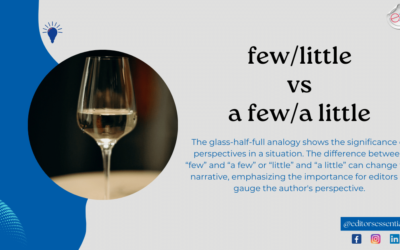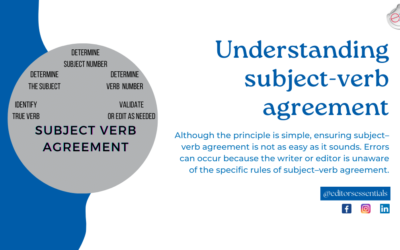Seemingly simple decisions such as which indefinite article will go before a word can quickly turn into a difficult choice. As you may well remember, the choice between a and an depends on how the first syllable of the word is pronounced. So, we write “an editor” or “a copyeditor”, but also “a European” or “an hour”. In the last two sentences, the pronunciation key for “European” is /jʊərəˈpiːən/ and that of “hour” is /ˈaʊə/ (depending on the choice of the dictionary, the keys could be slightly different; I followed the online version of the Oxford Dictionaries, lexico.com).
While editors and most authors have mastered this decision-making, sometimes even experienced editors may stumble into a problem when an abbreviation is encountered. However, this is a fascinating game that can be mastered with understanding and practice. All you need to remember is to use your ears and your eyes. To put it simply, hear the word mentally, even as you read it. Curious?
In fact, we may master this decision-making by logically approaching the problem by asking a series of three or four questions.
The first question to ask: How is the abbreviation pronounced?
Well, the indefinite article to be used before abbreviations is determined by how the abbreviation is read aloud. Is the abbreviation read letter by letter (initialism) or as a full word (an acronym)?
If the abbreviation is read letter by letter
Obviously, the sound of the first letter determines the choice of the indefinite article. However, recall that many consonants are pronounced with a vowel beginning. Here is the list: f, h, l, m, n, r, s, and x. I recommend that you look up your dictionary to check this. Interestingly, u is a vowel with a consonant sound. Again, look up the dictionary to see how.
Take a look at the following examples:
- BSc is read as bee-yes-cee. The first letter of the abbreviation is a consonant and is also pronounced like a consonant. So it automatically takes the article a. He holds better chances of getting the job since he has a BSc degree.
- HIV is read as aich-i-vee. The catch here is the eh pronunciation of the first letter h, a consonant that takes a vowel pronunciation. Since the sound of the abbreviation begins with a vowel, the article to be used here is an. Being an HIV patient, she found it hard to rent a place to run her business.
- The same is the case with LOC, whichis read as el-oh-cee and which will be preceded by the article an. An LOC is a clear military demarcation of the boundaries between the two countries.
- MBA is read as em-bee-a. Here too, the first letter is pronounced em, as if the vowel e has been prefixed to the m. Therefore, it will take the article an. With an MBA in Finance and Marketing, you will find the test a cakewalk.
- NGO is pronounced en-gee-o. As in the case of MBA, since the sound of the abbreviation begins with a vowel (en), the article to be used here is an. Navkshitij is an NGO working for the rehabilitation of the mentally challenged.
- RSS is pronounced a:r-s-s. Here the first letter r takes a vowel sound when read aloud. Therefore, it will take an as the article before it. It was an RSS worker who organised for food packets for the four marooned families.
- SUV is read aloud as es-you-vee. As in the case of MBA and NGO, an is the indefinite article to be placed before it. Sunil’s big dream is to own an SUV.
- UN is pronounced you-en, with the distinct consonant sound of y for the first letter u. Since the pronunciation of the abbreviation begins with a consonant sound, the article to be used here is a. Further clarifications are expected from a UN-affiliated organisation shortly.
If the abbreviation is read as a word
This case is similar to our standard decision-making. Take a look at the following examples.
- AIDS: This is a clear case of the acronym beginning with a vowel that has a vowel sound when read aloud. The indefinite article to be used in this case is an. Today, society treats an AIDS patient with sensitivity.
- FIFA is pronounced fee-faa, begins with a consonant that has a consonant sound. Hence, without a trace of doubt, use the article a. For football lovers, a FIFA match overrides every other event.
- NATO is pronounced Ne-TOh. Like FIFA, the spelling begins with a consonant, as does the pronunciation. So the article to be used before it is a. A NATO statement, issued by its secretary-general, clearly indicates its stand in the ongoing debate.
- OPEC: As in the case of AIDS, the spelling and pronunciation of the acronym begins with a vowel sound. Hence, the article an is placed before it. An OPEC report, released last night, provided a detailed analysis of current developments in the oil market and their impact on the world economy.
- RADAR: Here, the spelling and pronunciation of the acronym begins with the consonant R. Therefore, the article that is placed before it is a. The coastline can be monitored by a radar system.
- UNESCO is read as yU.Nes.Co, with a clear y sound marking the start. Therefore, the article to be used here is a even though the spelling begins with the vowel u. The y-sounding vowel at the beginning is the deciding factor here. A UNESCO official, present at the meeting, refused to comment on the issue.
- SIM: As seen in some earlier examples, the spelling and the pronunciation of this acronym begins with a consonant. Without a doubt it will take the indefinite article a before it. A SIM card is an integrated circuit.
- X-ray: You won’t need special X-ray vision to figure out this. The X here is pronounced eX, and, therefore, the article before the word X-ray is an. All we need is an X-ray to confirm whether it is a fracture or not.
If you are not sure how the abbreviation is pronounced
Here comes the real challenge. Let me share a related experience. I worked for a specialty chemistry publisher, and the abbreviation mof, for metal-organic framework is a frequent occurrence. As I edited, my choice was an because I have always read mof as em-oh-ef – letter by letter. However, the publishing editor indicated that we say a mof, as suggested by authors from this field, as the abbreviation is pronounced as if it is a word, a mawf.
So, with ubiquitous abbreviations such as NGO, the choice is easy. However, when editing specialist documents, the editor may not always know how the abbreviation would be pronounced. Here is some recommendation.
Unsure of pronunciation: Is the usage consistent?
If the choice of indefinite article before an unusual abbreviation is consistent, we may safely assume that the writing reflects the practice. We just follow the consistent usage but note this down in the style sheet for reference.
Unsure of pronunciation: Is the usage inconsistent, but skewed?
If the choice is inconsistent, but a majority of occurrences follow either of the two choices a or an, follow the majority, note this in the style sheet for reference, but also inform the author.
Unsure of pronunciation: Is the usage inconsistent, with almost equal occurrences?
Time to check with the author. It’s always better to ask, rather than to assume.
In summation:

- When the abbreviation begins with a vowel and the first letter is pronounced like a vowel, use an. (AIDS, OPEC).
- When the abbreviation begins with a vowel but the first letter is pronounced like a consonant, use a. (UN, UNESCO).
- When the abbreviation begins with a consonant but the first letter is pronounced as if there is a vowel before the consonant, use an. (HIV, LOC, MBA, NGO, RSS, SUV, X-ray).
- When the abbreviation begins with a consonant and the first letter is pronounced like a consonant, use a. (B.Sc, FIFA, NATO, RADAR, SIM).
- If you are unsure (mof), (i) follow the consistent usage or (ii) follow the majority occurrence and inform the author or (iii) ask the author.
We have designed a flowchart to help you with this decision-making. If you face the question of “which indefinite article to use before this abbreviation?”, follow the trail and you will easily know what to do.
Credits: Thanks to Kanaka Cadambi, a fellow member of the Indian Copyeditors Forum, for the examples. The featured image was created on Canva.





0 Comments